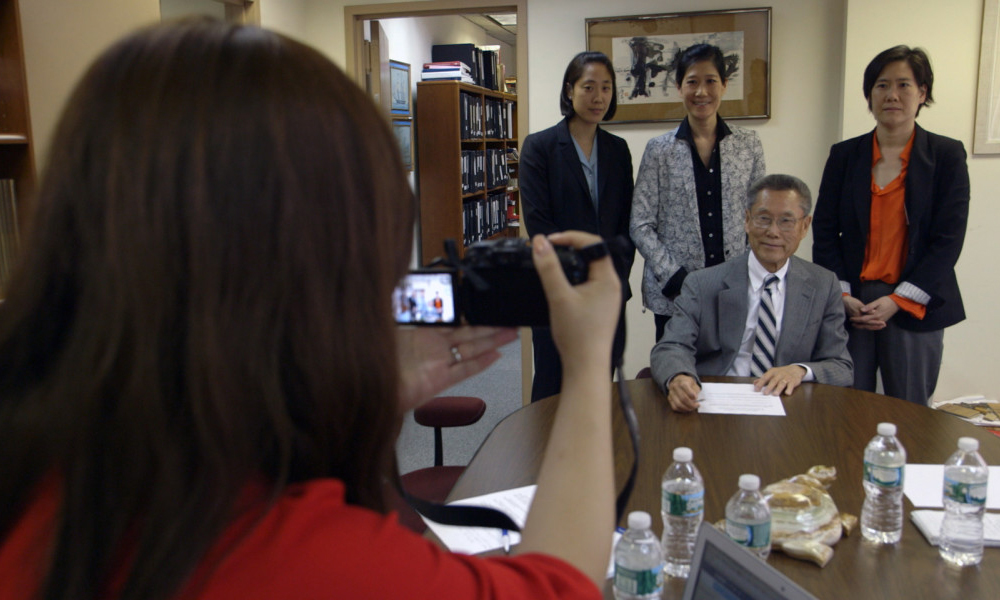At this point, you wonder what is there left for Steve James to do to be universally acknowledged as the greatest living documentarian we have. As it turns out, “Abacus: Small Enough to Jail,” the “Hoop Dreams” and “Life Itself” director’s latest may answer that question in a film that may be the closest he’ll come to making a conventional documentary in its straightforward style, laden with talking heads and graphics with factoids, and yet so compelling and deeply satisfying you realize only he could make it.
Easily described as a David vs. Goliath tale pitting the Manhattan District Attorney’s Office against Abacus Federal Savings Bank, a 30-year-old Chinatown institution that became the only bank to be indicted in the aftermath of the subprime mortgage crisis, “Abacus” immediately grows into something far more complex as you come to know the Sung family, whose patriarch Thomas started the bank to give the Chinese-American community in New York City a place where they could get a line of credit that was typically denied to them elsewhere in the city. By introducing Thomas and his wife Hwei Lin watching “It’s a Wonderful Life,” with Thomas citing the generous George Bailey as an inspiration, there’s no question where the filmmaker’s loyalties lie from the very start, but James is meticulous is laying out the cultural implications of the case on the Sung family and the greater Chinese-American community and how they were being held responsible for the actions of a single bad employee who had been let go for money laundering and went on to become the key witness to testify against them, despite following the proper (if poorly maintained) protocol for reporting him to compliance officers.
While having all the elements of a taut legal thriller, particularly since one of the Sung daughters, Chanterelle, actually worked for the the prosecuting district attorney Cyrus Vance Jr., James’ gift is conveying conflict in distinctly human terms, alternating between the ongoing trial, which Thomas chooses to fight despite its great expense in money and time — he’s 80, and how it has galvanized the already tight-knit Sung family to grow even closer, though each has their own opinions on the situation that’s unfolding before them, and sitting in on family dinners and strategy sessions. “Abacus” reveals itself to be the most richly observed portrait of Chinese-American family life since Amy Tan’s “The Joy Luck Club” and Wayne Wang’s subsequent film adaptation, both trenchantly funny and warm in depicting the brilliant Sung clan in all their glory, with bank manager Jill and lawyers Vera and Chanterelle fiercely competitive and caring for their parents — only James would likely see fit to include a scene of Thomas’ daughters futzing over their father’s satisfaction with a chicken avocado sandwich at lunch as a small-scale demonstration of their concern for him. Effortlessly showing how each of their perspectives have been shaped by the culture they were raised in – two generations separated by being raised on different sides of the Pacific Ocean – “Abacus” tells a far larger story than that of the Sungs, raising the stakes as a verdict in their case draws near.
For all the ugliness that accompanies the prosecution of Abacus, which time and again in James’ film is shown to be held to a different standard than those accused in similar cases, whether it is having white-collar employees trotted out for the press to see in handcuffs in the most public of hallways at court or being denied the plea deals others are typically offered, the beauty emerges in the Sungs’ resilience, ultimately fueled by the same rebellious ideals that likely brought Thomas and Hwei Lin to America in the first place and a belief in the justice system unparalleled elsewhere in the world. To watch as the latter fails them is harrowing, but to spend time in their company is sublime, almost enough so not to know whether it’s anger or joy that carries you out of the theater without your toes ever touching the ground.
“Abacus: Small Enough to Jail” opens on May 19th in New York at the IFC Center and on June 9th in Los Angeles at the NuArt.




